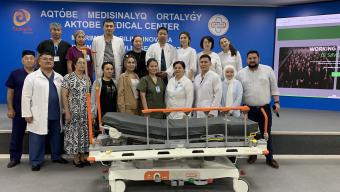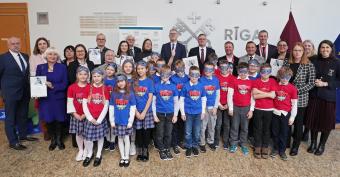In the far south of Chile, among landscapes of lakes and volcanoes, a community decided that stroke would no longer be a silent threat. Thus was born the first Angels Region in South America – a recognition that celebrates not only medical achievements but also a region-wide commitment to saving lives.
The story began in the Reloncaví Health Service, which covers the provinces of Llanquihue and Palena. Here, doctors, paramedics, local authorities, teachers, and students came together with a clear purpose: to improve stroke care from the first symptom to hospital treatment.
Becoming an Angels Region means meeting demanding criteria: hospitals have to be recognized with a WSO Angels Award, and emergency services with an EMS Angels Award, and a commitment to public awareness must create conditions for an informed and active community.
One of the pillars of this transformation was the FAST Heroes program, which teaches elementary school children to identify the three key signs of a stroke – drooping face, slurred speech, and arm weakness – and the importance of acting quickly. In Puerto Montt, the program reached the classrooms of Anahuac School ensuring that, in this region, even the youngest know that every minute counts.
In Chile, stroke is the second leading cause of death and disability. Every minute without treatment means the loss of two million neurons. But in Puerto Montt, every minute now counts in favour of life. Rodrigo Campos, leader of the Angels Initiative in Chile, highlights: “Not knowing where to go in case of a stroke is a huge risk. That’s why this work is vital.”
This achievement marks a milestone not only for Puerto Montt, but for the entire continent. Becoming the first Angels Region in South America is the result of a collective, sustained, and life-committed effort. It proves that when hospitals, emergency services, authorities, and communities work together, realities can be transformed.
Puerto Montt is not only leading stroke care: it is now inspiring an entire region to follow its example.
Q&A with Puerto Montt Hospital chief neurologist, Dr. Cristián Toloza
When you first learned about the Angels Regions strategy, what was your view of the potential of Del Reloncaví to achieve that status?
I thought it was a very good strategy, and we immediately saw that we were well on track to becoming an Angels Region, as we had already been working with that same vision for some time.
How would you describe the role of the Puerto Montt Hospital in the community?
Puerto Montt Hospital plays a fundamental role in our region, as it is the only high-complexity hospital with neuroimaging capabilities, so it handles all stroke cases. That’s why, as the neurology team, we focus on organizing not only in-hospital care but also pre-hospital care and education.
How is stroke care at Puerto Montt Hospital different now compared to five or ten years ago?
There’s a big difference. Now we have a dedicated stroke unit (UTAC); the percentage of patients receiving reperfusion therapy has increased from 5-6% to 12%, we now offer mechanical thrombectomy, and we have high-quality data records. We constantly review our numbers to identify areas for improvement.
Puerto Montt Hospital won its first WSO Angels Award in Q1 of 2024, and by the end of that year had turned gold into platinum. What were the key changes that led to international recognition for the hospital’s stroke care?
Having a standardized care protocol, keeping records of our patients, and – most importantly –coordinating with everyone involved in the stroke care process, from the moment the patient arrives at a low-complexity hospital or clinic until they reach our hospital. Data recording is essential.
You’re originally from a city in northern Chile. What brought you to Puerto Montt?
Not that far north—I’m from Curanilahue, in the 8th Region. I came to work as a general practitioner in 2001 and fell in love with the area, the landscapes, the people, and the quality of life. I was also motivated by the fact that there was a lot to be done and many motivated people.
What inspired you to become a doctor and a neurologist?
I’ve always liked helping others, and I believe that’s what medicine is about. I enjoy neurology because it involves a lot of clinical reasoning – asking questions and examining the evidence to reach a diagnosis. It challenges you every day.
Where does your passion for stroke care come from?
It’s a condition where we can truly make a difference, and doing things right can change a person’s prognosis. Stroke care involves everything medicine should be concerned with: education, prevention, rapid response, hospital care, rehabilitation, and once again education to prevent future events.
What do you like most about your job?
There’s no time to get bored – there’s always something to do or improve. The opportunities for improvement and the teamwork needed to reach our goals are very motivating for me.
How important is a good relationship between the hospital and emergency services, and how is it managed in your case?
It’s essential – time is brain, always. So emergency services are a key part of the process. We manage it through ongoing communication, training, and being consistently present.
How did the campaign to become an Angels Region impact the Puerto Montt community?
It had a positive impact. Making our work visible and showing that we’re working with certified quality builds trust, which is essential for continuing to form partnerships.
What advice would you give to other regions that want to follow your example?
The most important thing is to know that it’s possible, but nothing happens automatically, and it often takes time to reach the goal. It’s a journey with ups and downs, and you have to be ready for that. There are no magic formulas, but it’s helpful to listen to the experiences of other places and take notes – either to replicate ideas or adapt them to your regional reality.
Dr. Cristian Roblero, chief physician at SAMU Reloncaví, experienced the devastating impact of stroke firsthand. It was a turning point that still motivates him to contribute to stroke prevention, education, and care in every way he can.
SAMU Reloncaví is responsible for providing the first response from the public health system to any emergency affecting people’s health that requires immediate attention. We answer line 131, available to anyone regardless of their health insurance, age, or nationality, because in an emergency, what matters is a quick and effective response.
For us, the Angels Regions strategy was a great opportunity to assess our performance in such a critical condition as stroke. As a team, we were confident that we do good work and document it properly. But we took advantage of the opportunity, hoping to identify areas for improvement and learn from others about the best ways to manage stroke.
A crucial factor in being recognized as an Angels Region was the work of Dr. Toloza, our Health Service’s neurology lead, who had the vision to deepen coordination and collaboration across all levels of care. This has led to a much better-connected network, ready to act when needed.
A good relationship between the hospital and emergency services, is essential. For patients, it doesn’t matter who manages each part of the care chain—they care that everything is done well and promptly. That’s why coordination, communication, and mutual understanding between different levels of care are crucial.
Also, having reliable and complete clinical records helped us earn this recognition. Even if everything is done correctly in practice, it’s the records that provide evidence of good work.
Becoming the first emergency service in Chile to receive an Angels EMS award [in Q3 of 2024] was due to the work of many people. There’s a lot of silent work from a multidisciplinary team of about 180 people who continuously train to serve our community with the highest standards. It also reflects our willingness to be evaluated and challenged. We were the first not necessarily because we do things better than others– every SAMU in the country does excellent work –but because we accepted the challenge to be assessed, regardless of the outcome, because we trust and are proud of our work.
I’ve always been interested in medicine as a discipline because I’m fascinated by the complexity of the physical, chemical, and biological processes that make life possible. Combined with my desire to contribute to others’ well-being, this led me to pursue medicine.
My interest in emergency care, although always present, only materialized when I had the opportunity to join SAMU, initially as an interim head, in 2023. Within months, it became a permanent role, and I discovered a new world full of challenges, close contact with staff and patients, and a clinical role I had been missing [working in various areas of public health].
I have a personal connection to stroke because my father suffered one. As a family, we experienced the consequences and lasting effects of this disease. It happened while I was still in school and deeply affected us. My father was the breadwinner, and after the stroke, he was hospitalized for months and eventually lost his job. This caused serious financial problems and marked a turning point in how I view health and life.
Having experienced the devastating impact of stroke firsthand, and knowing that today we have the knowledge and tools to prevent more families from suffering the same, motivates me to contribute in every way I can to stroke prevention, education, and care. It also drives me to improve the overall performance of our health system, because I don’t believe health should depend on a person’s ability to pay, or that a family should become vulnerable due to illness.
I enjoy feeling that I can make a difference, even in things that may seem trivial. While we always wish we could do more, I believe change can come from simple actions like being kind, giving people time to express their concerns, and setting aside ego and pride to prioritize the common good in difficult situations.
Becoming an Angels Region has been an incredibly positive experience. It has made our work more visible, allowed us to learn from other regions and countries, enriched us deeply, and opened communication channels to share knowledge and best practices –something that will undoubtedly improve our performance.

